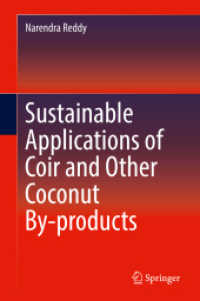- ホーム
- > 洋書
- > ドイツ書
- > Social Sciences, Jurisprudence & Economy
- > Education Science / Pedagogic
- > didactics, methodics, school education
Full Description
This book is devoted to the topic of mathematical skills development, which was the focus of Vygotsky's cultural-historical theory. It offers descriptions of studies of development of visual modelling in children and its use for educational purposes. Special attention is given to concrete examples of Vygotsky's work and educational programs that makes it possible to replicate the results in various settings.
The work also addresses conditions, means and predictors of mathematical concepts acquisition at different ages and educational levels (preschool, primary and middle secondary education). The book shows theoretical solidity of cultural-historical approach and experience of its implementation in teaching of mathematical knowledge in childhood and the study of the process of psychological development.
Contents
Part I. Theory and methodology for teaching of mathematics in cultural-historical approach: 1. Mathematics as system of cultural-historical knowledge and science.- 2. Development of symbolic functions and imagination as the basis for learning of mathematic at school: continuation of the dialogue between Piaget and Vygotsky.- 3. Psychological means and mathematical concepts acquisition in preschool age: which are better to use?.- 4. The pre-number period of teaching mathematics: psychological analysis of the different mathematical programs from the Cultural-Historical point of view.- 5. Mathematics Education and inclusion: reflections from the Cultura-Historical Theory.- 6. Teaching orienteering activity: principles and practices for the mathematics teaching organization.- 7. Processes of abstraction, generalization, and mathematical concepts formation: a reflection based on the Cultura-Historical Theory.- Part II. Research and proposals for teaching of mathematics: 8. Analysis of methods for teaching of mathematics in primary school according to Vygotsky's and Piaget's perspective.- 9. Mathematical abilities and self-regulation of the younger schoolchildren in different educational programs: longitudinal.- 10. Taysin M. Scaffolding multiplicative concepts' formation: a way of digital support.- 11. The knowledge of future Mathematics teachers about the logical procedure to identify as a way for the formation of mathematical concepts study.- 12. The math club as a space for teachers' learning: an analysis based on cultural-historical activity theory.- 13. Development of conceptual thinking in mathematics: cultural-historical experience in Brasilian context.- 14. Contributions of the cultural-historical theory in the teaching activity of time and area measures.








